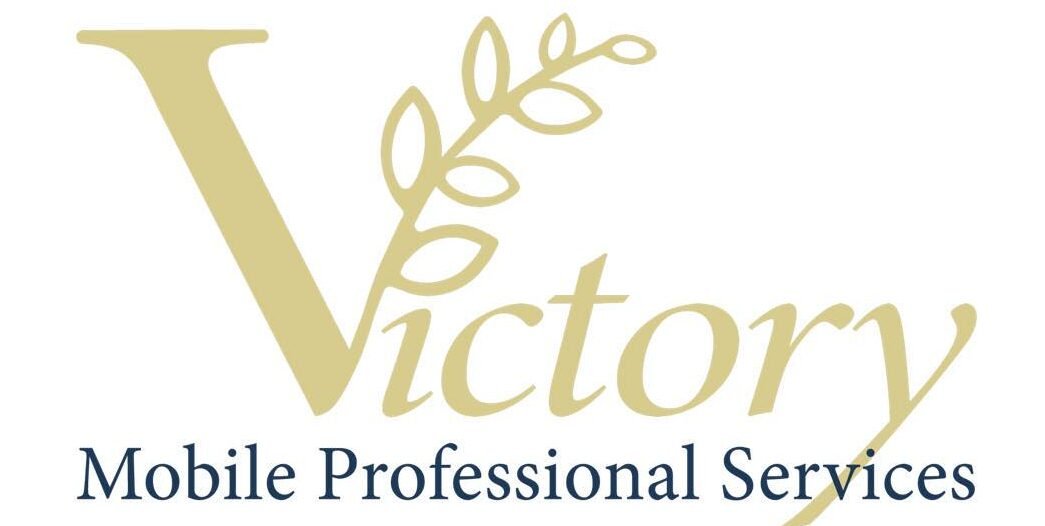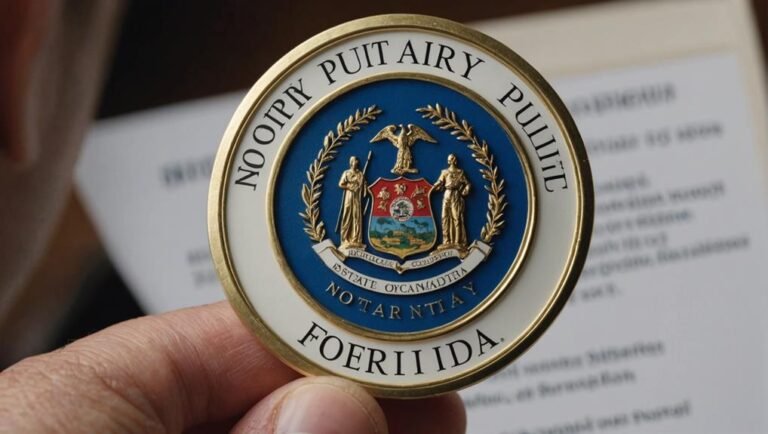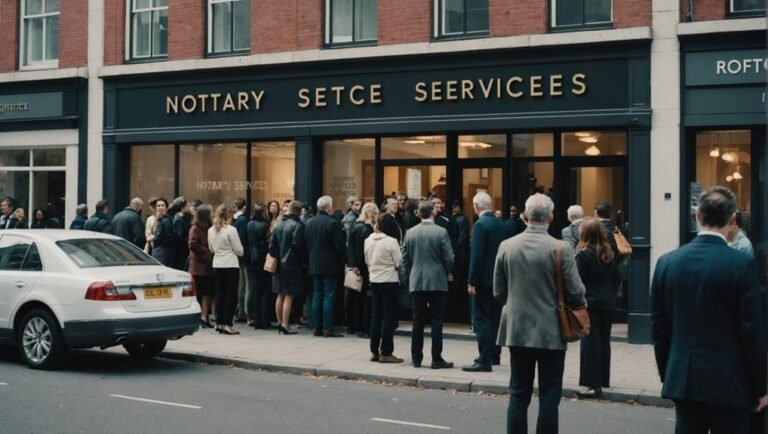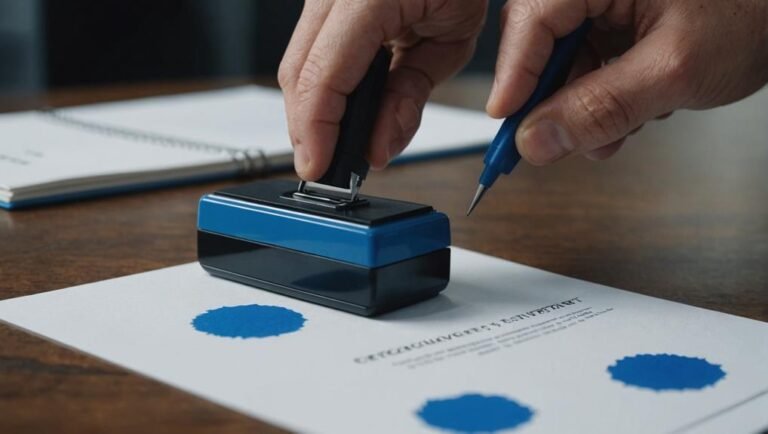For notary services in Florida, you can use a Florida driver's license or ID card, a passport from the Department of State, government-issued IDs, IDs from other US states, Canada, Mexico, or veteran health ID cards from the US Department of Veterans Affairs. These are acceptable forms of identification to verify your identity when notarizing documents. Remember, it's essential to present valid and unaltered IDs to comply with the requirements. If you're curious about additional identification options or procedures, further details are provided in the notary guidelines for your reference.
Key Takeaways
- Florida driver's license, passport, government-issued IDs, or out-of-state driver's licenses are acceptable.
- Personal knowledge or credible witnesses can verify the signer's identity.
- Ensure compliance with notarization procedures for reputable witness affidavits.
- Document all details in the notary's journal, including the type of identification used.
- Verify IDs for tampering, inconsistencies, and photo matching to the signer.
Florida's Acceptable Forms of Identification
When notarizing documents in Florida, you must be mindful of the acceptable forms of identification necessary for verifying a signer's identity.
As a notary in Florida, you're allowed to accept various forms of ID to confirm the authenticity of the individual signing the document. Acceptable forms of identification include a Florida driver's license or ID card, a passport issued by the Department of State, and other government-issued IDs.
Additionally, you can verify identity using driver's licenses or IDs from other US states, Canada, Mexico, or ID cards from any US armed forces branch. Moreover, Florida allows the use of veteran health ID cards from the US Department of Veterans Affairs, inmate IDs from the Florida Department of Corrections or US Department of Justice, and sworn statements from law enforcement officers.
It's essential to follow these approved methods and specific ID requirements in Florida to uphold the integrity of the notarization process.
Personal Knowledge and Credible Witness
Notaries in Florida have the authority to notarize documents based on their personal acquaintance with the signer or through the use of a reputable witness affidavit. Personal acquaintance refers to when the notary is familiar with the identity of the signer through previous interactions.
However, if the signer is unknown to the notary, a reputable witness affidavit can be utilized. In Florida, there are specific guidelines for the proper execution of reputable witness affidavits to ensure compliant notarization.
A reputable witness is someone who personally knows the signer and can verify their identity. In cases where the notary only knows one party, a Single Reputable Witness Affidavit is used. On the other hand, a Double Reputable Witness Affidavit is employed for unknown signers.
The witnesses must swear to the signer's identity and confirm the lack of proper identification. Adhering to these procedures is essential for a Florida notary to perform notarizations accurately and in accordance with the law.
Execution of Credible Witness Affidavit
To properly execute a Credible Witness Affidavit in Florida, it's essential that witnesses confirm the signer's identity and relevant circumstances before notarizing the document.
Notaries must verify that the witnesses don't have a financial interest in the transaction, as this could compromise the validity of the affidavit.
The Credible Witness Affidavit should be filled out accurately and completely prior to the notarization process.
It's important for Notaries to document the use of a Credible Witness in their journal to maintain proper records.
Depending on whether the signer is known or unknown to the Notary, a Single or Double Credible Witness Affidavit may be obtained.
Importance of Documentation and Certificates
Proper documentation and certificates play an essential role in the notarization process, ensuring accuracy and compliance with legal requirements.
Notarial certificates, available on CD, aid notaries in documenting transactions accurately.
Keeping a journal is vital for recording transaction details, including the form of identification used during the process.
Notaries must diligently note the type of identification presented by the signer on the notarial certificate to maintain compliance.
Proper documentation of all notarization transactions is pivotal for protecting the notary and ensuring adherence to legal standards.
By following correct procedures for notarization and meticulous documentation, the integrity and legality of the process are upheld.
Acceptable Forms of Identification for Notary Services
Various forms of identification are regarded as acceptable for notary services in Florida, including a Florida ID card, driver's license, and specific passports. In addition to these, other valid forms of ID for notarization purposes in Florida encompass driver's licenses or IDs from different US states, Canada, or Mexico, as well as ID cards from any US armed forces branch.
Notaries in Florida can also recognize a veteran health ID card from the US Department of Veterans Affairs, an inmate ID from the Florida Department of Corrections or the US Department of Justice, Bureau of Prisons, or a sworn statement from a law enforcement officer. These diverse forms of identification, ranging from official government-issued documents to specialized cards, ensure the authenticity and verification of the signer's identity during the notarization process.
Adherence to Florida's specific ID requirements is crucial for notaries to uphold the integrity and legality of the notarization procedures.
Can Notaries Accept Digital Driver's Licenses?
Notaries should be aware that the acceptance of digital driver's licenses as valid identification may vary by state, necessitating a thorough understanding of state-specific regulations regarding this matter.
When it comes to digital IDs for notarization, it's important to stay informed about the rules in your state.
Here are some key points to keep in mind:
- State Variance: Different states have different regulations on accepting digital driver's licenses. It's crucial to verify what's acceptable in your specific location.
- Verification Process: Notaries should have a clear process in place for verifying the authenticity of digital IDs to make sure the identification provided is legitimate.
- Compliance: To avoid any legal issues, notaries must adhere to the state-specific laws and guidelines related to accepting digital driver's licenses as a valid form of identification for their services.
Addressing Suspicious Signer IDs
When identifying suspicious signer IDs, closely examine for altered or mismatched features that may indicate potential fraud. Look for any signs of tampering or inconsistencies on the presented identification, such as altered IDs or mismatched information.
Verify that the photo on the ID matches the signer's current appearance, paying attention to any significant appearance changes. Additionally, confirm that the security features on the ID are present and authentic, further validating its legitimacy.
It is crucial to address any name differences between the ID and the signer, as handling these variations with caution is vital in preventing fraudulent activities. By thoroughly conducting photo verification and scrutinizing the security features, you can help safeguard against deceptive practices when verifying a signer's identity.
Remain vigilant and attentive to details to guarantee that the presented identification is genuine and matches the signer's appearance accurately.
Frequently Asked Questions
What Forms of ID Can a Florida Notary Accept?
You can accept various forms of ID as a Florida notary, like a state ID, driver's license, or passport. Confirm compliance with notary standards by verifying ID, documenting the process, and following legal requirements.
What Is the Best Form of Identification for a Notary?
When you notarize in Florida, the best identification options are a U.S. passport, state ID or driver's license, military ID, student ID, employee badge, consular ID, or tribal ID. Make sure you have valid identification for accurate identity verification.
Can a Notary Accept an Expired ID in Florida?
When in Florida, a notary should avoid accepting expired IDs for verification. State guidelines stress the importance of current, valid forms of identification to meet legal requirements. Always adhere to Florida's rules to guarantee smooth notary procedures.
What Are the Requirements to Notarize a Document in Florida?
To notarize a document in Florida, you need to follow specific legal requirements. Notary publics verify signers' identities through accepted ID types and credible witnesses. It is essential to adhere to identification guidelines for accurate document authentication.
Conclusion
To sum up, when looking for notary services in Florida, it's essential to make sure you have the acceptable forms of identification needed. By adhering to the guidelines established by the state, you can ensure a seamless and effective notarization process.
Remember, a notary's role is to authenticate documents and identities, so having the correct documentation is vital for a successful transaction. Just like a well-functioning machine, proper identification keeps the notary process operating smoothly.






